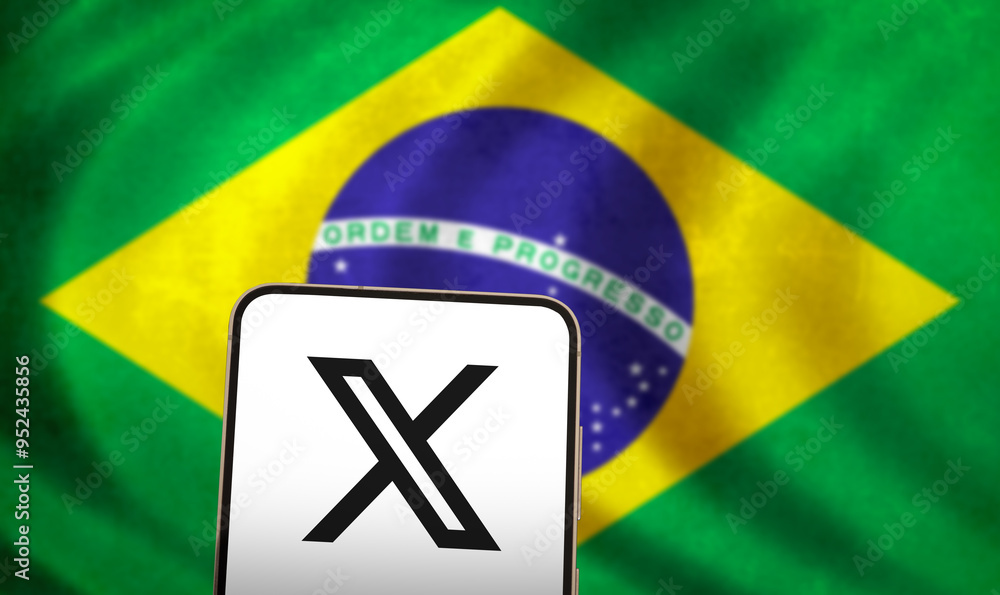

Brazil’s decision to ban Elon Musk’s X platform underscores the country’s proactive approach to content moderation and sets a significant precedent for global regulatory practices. This move, which involves the legal representative of the platform, may inspire other nations to adopt stricter laws to combat misinformation and enhance accountability among tech companies. As the digital landscape evolves, this suspension serves as a wake-up call for platforms that prioritise free speech without sufficient safeguards against harmful content. The ripple effects of Brazil’s actions could lead to an era where governments worldwide, guided by figures like Supreme Court Judge Justice Alexandre de Moraes, are emboldened to impose similar regulations. Consequently, businesses must critically reassess their content policies and ethical responsibilities, fostering a more responsible online environment amid increasing scrutiny.
The recent Brazil ban on Elon Musk’s X platform highlights the intricate balancing act between free speech and the necessity of content moderation. This situation emphasises the responsibility of social media companies to champion open dialogue while implementing robust mechanisms to filter disinformation, especially as the platform was allegedly spreading disinformation. As governments, including Brazil’s, increasingly step in to regulate online interactions, tech billionaire Musk must navigate this complex landscape by adopting transparent policies that align with legal expectations while safeguarding users’ rights to express their opinions. Following the ban, Musk appointed a new legal representative to handle the situation, underscoring the need for a cooperative approach. In cities like Rio de Janeiro, the lessons learned from Brazil’s decisive actions call for dialogue between regulators and technology companies to forge solutions that uphold public discourse without compromising safety in the digital space. Additionally, virtual private networks (VPNs) have surged as users seek ways to access content amid these restrictions.
Brazil’s stringent content moderation laws, highlighted by the recent suspension of a social media company linked to Elon Musk, mark a pivotal shift in how governments approach the regulation of social media. This decisive action underscores Brazil’s commitment to combating misinformation and hate speech while also aligning with the principles of the Brazilian Constitution. The involvement of Justice Moraes in these cases indicates a robust legal framework that holds platforms accountable. As other South American countries observe Brazil’s bold measures, they may feel inspired to adopt similar frameworks to enhance governance over digital communication. This potential wave of regulation could significantly reshape the dynamics between tech companies and national authorities, compelling them to rethink their policies and improve content moderation practices. In a global context where misinformation has real-world consequences, Brazil’s initiative could spark a trend of strengthened governance that leaves social media companies with no choice but to adapt or face significant repercussions.
As social media platforms face increased regulatory scrutiny, particularly following recent rulings by the country’s supreme court, businesses in South America must navigate a complex landscape filled with challenges and opportunities. With the former president’s administration emphasising stricter content moderation in line with Brazilian laws, companies must reassess their social media strategies to ensure compliance with evolving regulations. This could involve implementing more rigorous content policies and enhancing transparency, especially for Brazilian users who are increasingly concerned about online safety. Hefty fines and court orders may loom for those who fail to adhere to these standards. However, the heightened focus on responsible online conduct also allows businesses to establish trust with consumers by prioritising ethical digital practices, such as promoting virtual private networks (VPNs) for enhanced privacy. By proactively engaging with the regulatory environment and committing to combating misinformation, businesses can distinguish themselves in the marketplace, building a reputation as responsible entities that honour user rights and regulatory expectations. In this dynamic climate, adaptability and foresight will be crucial for businesses aiming to thrive amidst the shifting tides of digital governance.
The ongoing tension between Elon Musk and Brazilian Justice Minister Alexandre de Moraes exemplifies the escalating power struggle between influential tech leaders and government regulators over online content. This clash, rooted in differing views on the responsibilities of social media platforms, especially regarding court orders, underscores the principles of free speech versus accountability. Musk’s commitment to unfettered dialogue contrasts sharply with de Moraes’s vigorous stance on ensuring adherence to the law, particularly in the face of disinformation spread via iOS and Android systems. Legal experts note that as governments like Brazil implement stricter regulations, tech giants may be compelled to adapt their operational protocols to align with national interests. Musk replied to these challenges by emphasising the importance of open dialogue, even as political opponents push for greater accountability. This battle highlights the need for a balanced approach to content moderation and collaborative discourse between technology firms and regulatory authorities. The outcomes of this struggle will inevitably shape the future of digital governance, redefining the interplay between justice and technology in our hyper-connected world.
Brazil’s decision to suspend operations of X reflects a determined stance against disinformation and highlights the government’s commitment to establishing accountability in digital communication. This action stems from increasing concerns about the pervasive spread of false information, which poses significant risks to democratic processes and public well-being. By imposing stringent content moderation laws, Brazilian authorities aim to set a precedent within their borders and globally, signalling to other nations that regulatory frameworks for social media can be effectively enacted. This suspension serves as a critical reminder that while technology platforms might advocate for free speech, they are responsible for ensuring that their platforms do not become breeding grounds for harmful content. As such, Brazil’s motivations underscore a broader movement towards enhanced oversight and accountable governance in the digital age.
The evolving regulatory landscape for social media platforms, exemplified by Brazil’s recent actions, necessitates a keen understanding from all stakeholders involved. As governments across the globe adopt stricter content moderation laws, stakeholders—including tech companies, businesses, and users—must navigate the resulting complexities. For tech companies, this means reassessing their operational protocols to ensure compliance while preserving the core values of free expression. Businesses leveraging social media for marketing must adapt their strategies to align with enhanced accountability expectations, thus fostering trust and transparency with consumers. Meanwhile, users should remain vigilant, understanding that although stricter regulations aim to mitigate disinformation, they may also influence the dynamics of free speech online. As this regulatory tide rises, proactive engagement among all parties will be essential in shaping a balanced digital environment that upholds the integrity of online communication.
Brazil’s decisive action against X calls for responsible digital communication worldwide. By prioritising accountability over unchecked free speech, the Brazilian government advocates for a balanced approach to content moderation that other nations may follow. The suspension of X’s operations highlights the urgent need for tech platforms to recognise their role in curbing the spread of misinformation, which not only jeopardises democratic integrity but also public safety. This move underscores the growing expectation that governments will actively regulate digital spaces, fostering an environment where the dissemination of accurate information is prioritised. As Brazil sets this precedent, it prompts a broader dialogue on how global stakeholders can collectively enhance digital governance, ensuring that platforms uphold their responsibility while navigating the complexities of free expression.
Brazil’s suspension of X will likely resonate across the global tech landscape, prompting other platforms to reassess their content moderation frameworks and accountability measures. As governments worldwide observe Brazil’s proactive approach to combating disinformation, there may be a shift towards similar regulatory initiatives that emphasise corporate responsibility within the digital sphere. Tech giants, especially those operating in multiple jurisdictions, must balance compliance with diverse regulatory demands while maintaining their commitment to free expression. This scenario urges companies to engage more closely with users and regulators, fostering collaborative relationships and encouraging transparency and trust. The potential for a coordinated response from other nations could lead to an era where social media firms are held to higher standards, effectively reshaping the operational landscape in which they function.

This website uses cookies to improve your experience. Choose what you're happy with.
Required for the site to function and can't be switched off.
Help us improve the website. Turn on if you agree.
Used for ads and personalisation. Turn on if you agree.
This website uses cookies to improve your experience. Choose what you're happy with.
Required for the site to function and can't be switched off.
Help us improve the website. Turn on if you agree.
Used for ads and personalisation. Turn on if you agree.